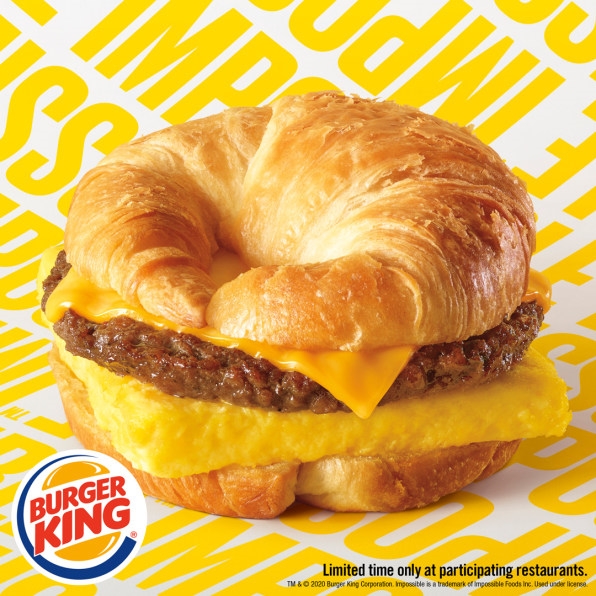Meatless ‘Impossible Sausage’ is coming to breakfast sandwiches at Burger King
Three and a half years ago, the Impossible Burger made its restaurant debut at David Chang’s high-end Momofuku Nishi in New York. Now, with the burger on menus in more than 17,000 restaurants, Impossible Foods is launching its next product: Impossible Pork, which will show up first in the form of a preseasoned “Impossible Sausage” on breakfast sandwiches at some Burger King locations.

“Pork is arguably one of the most ubiquitous forms of protein in the incumbent industry,” says David Lee, the CFO at Impossible Foods. “We believe that it may be the most commonly-served animal for food globally. Our mission at Impossible Foods has begun here in the U.S., and we’re in parts of Asia, but it’s truly global. We wanted to make sure that we launched platform products that can be enjoyed in every part of the world and could be turned into whatever cuisine is relevant for the culture it’s being served in.”
Unlike pork made from pigs, the new food can be certified kosher and halal (the company is currently in the process of getting those certifications.) Made into a sausage, it has as much protein as typical pork sausage. It also has more iron, much less fat, fewer calories, and no cholesterol. Along with the Impossible Sausage, the company is making a version of pork that can be used in any dish that typically uses ground meat, such as dumplings or spring rolls. The company is serving the first tastes of Impossible Pork at the Consumer Electronics Show this week.

The recipe builds on the company’s research that led to the Impossible Burger—particularly the inclusion of heme, a molecule responsible for much of the flavor in meat, which Impossible Foods scientists, led by founder Pat Brown, a former Stanford professor, found a way to reproduce. “Brown’s approach eight years ago, when he started the company, was to create fundamental research and development to understand how to crack the molecular code of meat, whether you’re interested in beef or pork or chicken,” Lee says. That means that it’s possible to iterate to create new products, such as Impossible Pork and Impossible Sausage, fairly quickly; Lee says that the company made the decision to launch the pork within the last year.
The new products are the next step in the company’s longer-term goal to replace animal protein with plant-based protein—something that Brown has said that he wants to accomplish by 2035. Pork, like other meat, has serious environmental and health impacts, including methane emissions from manure and overuse of antibiotics in pigs that are helping to contribute to antibiotic-resistant superbugs.
Pig farming is also a precarious industry: In China, the world’s biggest market for pork, swine fever has killed millions of pigs since an outbreak began in 2018. Using plants as ingredients can eliminate many of the risks. “The beauty of our technology is that it leverages the fundamental efficiency of plants for the environment,” Lee says. “We like to say, just as an animal turns plants through its consumption into meat, we skip the animal.”

The company wanted to launch the Impossible Sausage at Burger King in part because of the chain’s importance as a brand. Beginning in late January, Burger King will test the “Impossible Croissan’wich,” served with egg and cheese on a croissant, at 139 restaurants in five areas across the country: Savannah, Georgia; Lansing, Michigan; Springfield, Illinois; Albuquerque, New Mexico; and Montgomery, Alabama.
“Burger King is an important strategic customer of ours,” Lee says. The chain tested an Impossible Whopper regionally last April, before rolling out the offering nationwide in August. “They’ve been able to demonstrate that the core meat eater, the everyday consumer of beef Whoppers, loves Impossible Whoppers, and our mission is designed to serve the heart of the market. We never intended to be niche. We intend to be mainstream.”
(23)



